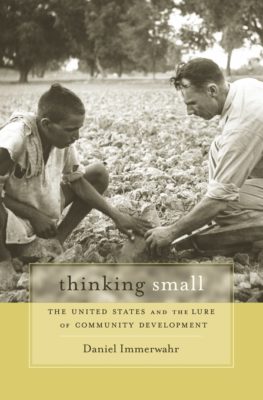Editor's Note
“Worldwide, empires fell apart after WWII as nationalists led revolutions to break with their metropoles. The U.S. empire followed a different path.”—Daniel Immerwahr
“How do we harness the power of community to provide for everyone and not just some?”—Ruben Flores
 Welcome back to our catch-up with past USIH prize winners! We asked what they’re working on now, and learned how their scholarship connects to our #USIH2020 conference theme of “Revolution & Reform.” Today we hear from not one, but two, authors: Ruben Flores, associate professor of history at the University of Rochester, who won the 2015 USIH Book Prize, and Daniel Immerwahr, associate professor of history at Northwestern University, who won the 2016 USIH Book Prize. Check out Flores’ Backroads Pragmatists: Mexico’s Melting Pot and Civil Rights in the United States and Immerwahr’s Thinking Small: The United States and the Lure of Community Development. Also, #USIH friends! A friendly reminder that there’s still time to enter YOUR book for our annual prize. Entries are due 15 April 2020 and you can find all the submission details here.
Welcome back to our catch-up with past USIH prize winners! We asked what they’re working on now, and learned how their scholarship connects to our #USIH2020 conference theme of “Revolution & Reform.” Today we hear from not one, but two, authors: Ruben Flores, associate professor of history at the University of Rochester, who won the 2015 USIH Book Prize, and Daniel Immerwahr, associate professor of history at Northwestern University, who won the 2016 USIH Book Prize. Check out Flores’ Backroads Pragmatists: Mexico’s Melting Pot and Civil Rights in the United States and Immerwahr’s Thinking Small: The United States and the Lure of Community Development. Also, #USIH friends! A friendly reminder that there’s still time to enter YOUR book for our annual prize. Entries are due 15 April 2020 and you can find all the submission details here.
What are you working on now?
Ruben Flores:
A biography of Moises Saenz that focuses on his time with John Dewey. It’ll turn out to be a comparative meditation on democracy, seen from the perspective of the early 20th-century US and Mexico.
Daniel Immerwahr: One thing I’m doing, some studies of the popular culture surrounding post-1945 U.S. foreign relations. From Donald Duck comic books to Star Wars, cultural texts tried to interpret the relationship between the United States and the wider world for large audiences. I’d like a better understanding of that.
 Within our field of intellectual history, what topics or approaches are you excited about?
Within our field of intellectual history, what topics or approaches are you excited about?
Immerwahr: We’re overdue for some penetrating studies of the Internet—how it conceptually operates, how it’s been theorized, what sort of temporality and spatiality it encourages. I was encouraged to read Joy Lisi Rankin’s A People’s History of Computing in the United States, which tries to wrest the topic away from the mythology of Silicon Valley.
Flores: I’ve noticed a turn to methods and topics associated historically with American Studies, and that intrigues me. Why now, I wonder?
 This year, our annual meeting theme is “Revolution and Reform.” Can you reflect on how those ideas connect to your scholarship?
This year, our annual meeting theme is “Revolution and Reform.” Can you reflect on how those ideas connect to your scholarship?
Immerwahr: It’s come up in my research on U.S. empire, which is distinctive for how it engaged with the forces of decolonization. Worldwide, empires fell apart after WWII as nationalists led revolutions to break with their metropoles. The U.S. empire followed a different path. Of its four largest colonies, only one, the Philippines, got independence. Leading politicians other three—Hawai‘i, Alaska, and Puerto Rico—pursued different forms of decolonization, reformist versions that would preserve their relationship with the U.S. mainland.
Flores: Capitalism’s excesses are prominent everywhere in our culture and in our contemporary historiography. For me, this year’s theme takes me straight to the question of a reformed political economy: how do we harness the power of community to provide for everyone and not just some? To take care of everyone as human beings?

0